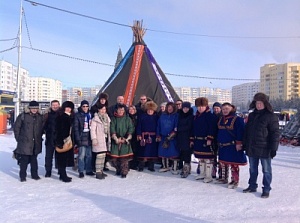TSU, St. Petersburg State University, the Northern (Arctic) Federal University, and a number of leading scientific centers of the Russian Federation will unite in a consortium to study environmental changes in the Arctic and the impact of these transformations on residents of the Yamalo-Nenets Autonomous Okrug. The initiative for the network project was put forward by the government of the region. The data obtained will help to more effectively build medical and preventive work with the population.
- Great attention is now focused on the Arctic. Research on climate change is being carried out by both Russian and international centers. At the same time, the local population has remained a little apart, - says Olga Shaduyko, director of the TSU Center for International Collaboration, coordinator of the SecNet network. - Two years ago, for the first time, SecNet workshop, which was held in Salekhard with the support of the authorities of the Yamal-Nenets Autonomous Okrug, invited representatives of indigenous peoples - the Nenets, Khanty, and Zyryans. They told how their lives have changed in the context of climate change, and it became quite obvious that these people needed to be included in research projects both as an object of study and as suppliers of the latest information.
For example, reindeer herders point out that winters in recent years are less severe, temperature drops from -30 or -40 ° C to -10 or -15 ° C are more frequent. There are more days with a strong snow blizzard, which is a big minus for nomadic people - there are often lost deer, and people have to look for them in the tundra, wasting time and effort.
Environmental changes affect not only economic and social life, but they also affect the emotional state and the health of those who permanently or temporarily, like shift workers, live in the Arctic. Scientists will find out what the impact is, how it is caused, what the risk factors are, and how to minimize their harmful effects. The participants of the network project will be universities (TSU, St. Petersburg State University, Tyumen State University, MIPT, and SFU), Federal Research Center for the Integrated Study of the Arctic, Medical Prevention Center YNAO, and local authorities. The network will be coordinated by the Arctic Research Center (Nadym).
Terry Callaghan, an outstanding researcher, winner of the Nobel Peace Prize for studying climate change issues as part of an international group of experts, was invited to the consortium as an expert at TSU and Sheffield University.
According to Olga Shaduyko, the overall concept of the network project was discussed at the seminar that was held March 3 in Nadym. Comprehensive studies will include the study of environmental transformations and the impact of these processes on the traditional economy and human health. One of the results of the project should be the creation of an IT system capable of automatically analyzing the information collected by scientists, generating reports on the questionnaires of the residents of the YNAO and structuring this data, based on the task to be solved.

